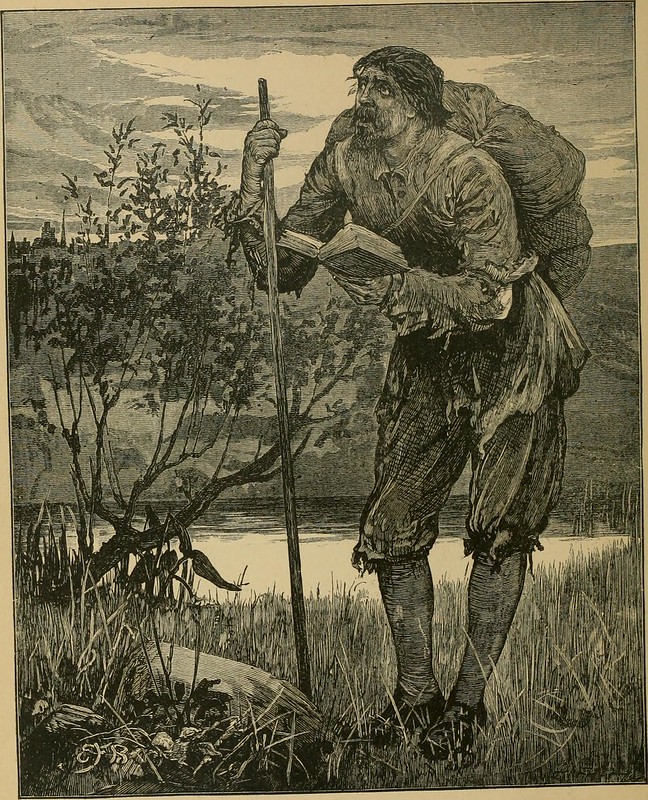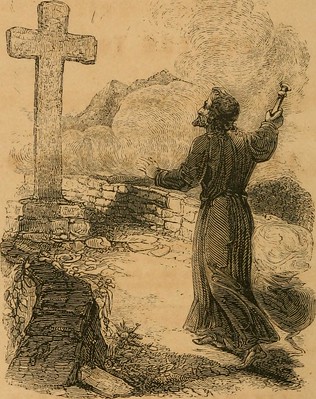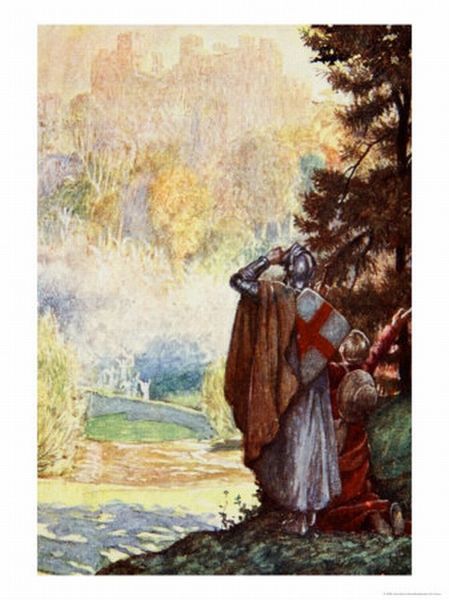
John Bunyan is rightly famous for writing The Pilgrim’s Progress while in prison for preaching the gospel. This allegory of Pilgrim’s journey from the City of Destruction to the Celestial City recount’s Bunyan’s experience. At first, like everyone in the city destined for destruction under God’s judgment, he was godless – uninterested in spiritual things and devoted to following his own desires wherever they might lead him. Known for his bad language and mischief, the poor tinker’s son would sneak up and ring the church bells, finding this enticing sin hilarious.
He was raised to know and fear God, so at times terror would take hold of him, knowing he deserved only God’s punishment and eternal condemnation. But these periodic worries were not enough to bring him to repentance. Even several experiences of divine deliverance from physical death did not turn him around. Having returned from the war, Bunyan married at the age of 19. The two “did not have a pot or spoon” between them but his wife brought with her two books including, “The Plain Man’s Pathway to Heaven.” His wife helped him learn how to read and these two books finally prompted him to leave his godless childhood and set out in search of God.
It wasn’t long, however, before Bunyan found himself in the Slough of Despond. The more he tried to obey God the more he despaired of doing so. His doubts and fears plagued him. At one point, giving in to an old temptation, he abandoned both hope and restraint, reasoning, “If I am already damned, I may just as well be damned for many sins as for a few sins.”
Though Bunyan resisted the Lord’s leading, God was patient to purse him. A local woman rebuked him for his foul language. Ashamed, he resolved to better himself and never again uttered the curses or crude words for which he had been so well known in his childhood. The change prompted much notice in town but provided no comfort or assurance for the aspiring Christian. Of course this was the Village of Morality and though all there appear nice and well behaved, inwardly they are corrupt and evil – filled with hypocrisy and absent all peace and joy. This was Bunyan’s feeling: “I was nothing but a poor, painted hypocrite. I did all I did, either to be soon or, or to be well spoken of by men. I knew not Christ, nor grace, nor faith, nor hope.”
Some poor women in a neighboring town shared with Bunyan about their simple faith in Christ alone for salvation – and through their witness they point him to the Wicket Gate, which opens to the Narrow Way that leads to salvation. For the first time he begins to realize salvation cannot come from his own efforts but must be a gift of God’s grace. But still he did not know how to receive this gift or be set free from the heavy burden he carried.
From this time on he began to read the Bible in earnest and to consult with a godly local pastor, who helped him understand God’s Word. No doubt this time for Bunyan was his visit to the Interpreter’s House through which the Holy Spirit finally showed him his absolute need for grace. “Your fair pretensions must wholly be waived, Your best resolutions be crossed; You never can know yourself to be saved; Till you own you are utterly lost.”

And so Bunyan began to cry out for God’s mercy, learning, “not saved are we by trying, from self can come no aid,” and “It is not thy tears of repentance nor prayers, But the blood that atones for the soul; On Him then Who shed it, thou mayest at once Thy weight of iniquity roll. Look! Look! Look and live!” Yet still Bunyan was plagued by guilt and fear and could find no peace.
The final turning point came when he was given Luther’s commentary on Galatians. Luther, too, had been plagued by the inadequacy of his own efforts to bring him peace – even his utmost religious devotions and most zealous confessions. Just as pilgrim felt his burden slip from his shoulders at The Cross of Christ, so Bunyan was finally set free from his guilt and fear when walking through a field the idea struck him, “Thy righteousness is in heaven.” The light of grace pierced his soul so he saw, “God made him who had no sin to be sin for us that in him we might become the righteousness of God” (2 Cor. 5:21).
“He discovered that his good frame of mind did not make his righteousness any better, nor did his bad frame of mind make it worse; but his righteousness was a Person, Who had loved him and had given Himself for him and Who was the same yesterday and today and forever.” (Wholesomewords bio)

There is more to his story, of course, just as there is much more to Pilgrim’s journey. Difficulty Hill followed soon after the cross, but Pilgrim found encouragement and armor in the Palace Beautiful. His journey took him through the Valley of Humiliation and the Valley of the Shadow of Death, and he encountered many companions along the way – some helpful and others quite dangerous. Even as a believer Pilgrim had to endure Doubting Castle and the assaults of Giant Despair. Most likely this refers to Bunyan’s 12 years in prison. But those very years allowed him to write many books, including the Pilgrim’s Progress, which is the most published book in history aside from the Bible.
